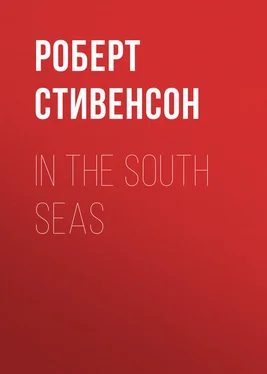Роберт Стивенсон - In the South Seas
Здесь есть возможность читать онлайн «Роберт Стивенсон - In the South Seas» — ознакомительный отрывок электронной книги совершенно бесплатно, а после прочтения отрывка купить полную версию. В некоторых случаях можно слушать аудио, скачать через торрент в формате fb2 и присутствует краткое содержание. Жанр: literature_19, foreign_antique, foreign_prose, Путешествия и география, на английском языке. Описание произведения, (предисловие) а так же отзывы посетителей доступны на портале библиотеки ЛибКат.
- Название:In the South Seas
- Автор:
- Жанр:
- Год:неизвестен
- ISBN:нет данных
- Рейтинг книги:5 / 5. Голосов: 1
-
Избранное:Добавить в избранное
- Отзывы:
-
Ваша оценка:
- 100
- 1
- 2
- 3
- 4
- 5
In the South Seas: краткое содержание, описание и аннотация
Предлагаем к чтению аннотацию, описание, краткое содержание или предисловие (зависит от того, что написал сам автор книги «In the South Seas»). Если вы не нашли необходимую информацию о книге — напишите в комментариях, мы постараемся отыскать её.
In the South Seas — читать онлайн ознакомительный отрывок
Ниже представлен текст книги, разбитый по страницам. Система сохранения места последней прочитанной страницы, позволяет с удобством читать онлайн бесплатно книгу «In the South Seas», без необходимости каждый раз заново искать на чём Вы остановились. Поставьте закладку, и сможете в любой момент перейти на страницу, на которой закончили чтение.
Интервал:
Закладка:
Before yet the anchor plunged a canoe was already paddling from the hamlet. It contained two men: one white, one brown and tattooed across the face with bands of blue, both in immaculate white European clothes: the resident trader, Mr. Regler, and the native chief, Taipi-Kikino. ‘Captain, is it permitted to come on board?’ were the first words we heard among the islands. Canoe followed canoe till the ship swarmed with stalwart, six-foot men in every stage of undress; some in a shirt, some in a loin-cloth, one in a handkerchief imperfectly adjusted; some, and these the more considerable, tattooed from head to foot in awful patterns; some barbarous and knived; one, who sticks in my memory as something bestial, squatting on his hams in a canoe, sucking an orange and spitting it out again to alternate sides with ape-like vivacity – all talking, and we could not understand one word; all trying to trade with us who had no thought of trading, or offering us island curios at prices palpably absurd. There was no word of welcome; no show of civility; no hand extended save that of the chief and Mr. Regler. As we still continued to refuse the proffered articles, complaint ran high and rude; and one, the jester of the party, railed upon our meanness amid jeering laughter. Amongst other angry pleasantries – ‘Here is a mighty fine ship,’ said he, ‘to have no money on board!’ I own I was inspired with sensible repugnance; even with alarm. The ship was manifestly in their power; we had women on board; I knew nothing of my guests beyond the fact that they were cannibals; the Directory (my only guide) was full of timid cautions; and as for the trader, whose presence might else have reassured me, were not whites in the Pacific the usual instigators and accomplices of native outrage? When he reads this confession, our kind friend, Mr. Regler, can afford to smile.
Later in the day, as I sat writing up my journal, the cabin was filled from end to end with Marquesans: three brown-skinned generations, squatted cross-legged upon the floor, and regarding me in silence with embarrassing eyes. The eyes of all Polynesians are large, luminous, and melting; they are like the eyes of animals and some Italians. A kind of despair came over me, to sit there helpless under all these staring orbs, and be thus blocked in a corner of my cabin by this speechless crowd: and a kind of rage to think they were beyond the reach of articulate communication, like furred animals, or folk born deaf, or the dwellers of some alien planet.
To cross the Channel is, for a boy of twelve, to change heavens; to cross the Atlantic, for a man of twenty-four, is hardly to modify his diet. But I was now escaped out of the shadow of the Roman empire, under whose toppling monuments we were all cradled, whose laws and letters are on every hand of us, constraining and preventing. I was now to see what men might be whose fathers had never studied Virgil, had never been conquered by Cæsar, and never been ruled by the wisdom of Gaius or Papinian. By the same step I had journeyed forth out of that comfortable zone of kindred languages, where the curse of Babel is so easy to be remedied; and my new fellow-creatures sat before me dumb like images. Methought, in my travels, all human relation was to be excluded; and when I returned home (for in those days I still projected my return) I should have but dipped into a picture-book without a text. Nay, and I even questioned if my travels should be much prolonged; perhaps they were destined to a speedy end; perhaps my subsequent friend, Kauanui, whom I remarked there, sitting silent with the rest, for a man of some authority, might leap from his hams with an ear-splitting signal, the ship be carried at a rush, and the ship’s company butchered for the table.
There could be nothing more natural than these apprehensions, nor anything more groundless. In my experience of the islands, I had never again so menacing a reception; were I to meet with such to-day, I should be more alarmed and tenfold more surprised. The majority of Polynesians are easy folk to get in touch with, frank, fond of notice, greedy of the least affection, like amiable, fawning dogs; and even with the Marquesans, so recently and so imperfectly redeemed from a blood-boltered barbarism, all were to become our intimates, and one, at least, was to mourn sincerely our departure.
CHAPTER II – MAKING FRIENDS
The impediment of tongues was one that I particularly over-estimated. The languages of Polynesia are easy to smatter, though hard to speak with elegance. And they are extremely similar, so that a person who has a tincture of one or two may risk, not without hope, an attempt upon the others.
And again, not only is Polynesian easy to smatter, but interpreters abound. Missionaries, traders, and broken white folk living on the bounty of the natives, are to be found in almost every isle and hamlet; and even where these are unserviceable, the natives themselves have often scraped up a little English, and in the French zone (though far less commonly) a little French-English, or an efficient pidgin, what is called to the westward ‘Beach-la-Mar,’ comes easy to the Polynesian; it is now taught, besides, in the schools of Hawaii; and from the multiplicity of British ships, and the nearness of the States on the one hand and the colonies on the other, it may be called, and will almost certainly become, the tongue of the Pacific. I will instance a few examples. I met in Majuro a Marshall Island boy who spoke excellent English; this he had learned in the German firm in Jaluit, yet did not speak one word of German. I heard from a gendarme who had taught school in Rapa-iti that while the children had the utmost difficulty or reluctance to learn French, they picked up English on the wayside, and as if by accident. On one of the most out-of-the-way atolls in the Carolines, my friend Mr. Benjamin Hird was amazed to find the lads playing cricket on the beach and talking English; and it was in English that the crew of the Janet Nicoll , a set of black boys from different Melanesian islands, communicated with other natives throughout the cruise, transmitted orders, and sometimes jested together on the fore-hatch. But what struck me perhaps most of all was a word I heard on the verandah of the Tribunal at Noumea. A case had just been heard – a trial for infanticide against an ape-like native woman; and the audience were smoking cigarettes as they awaited the verdict. An anxious, amiable French lady, not far from tears, was eager for acquittal, and declared she would engage the prisoner to be her children’s nurse. The bystanders exclaimed at the proposal; the woman was a savage, said they, and spoke no language. ‘ Mais , vous savez ,’ objected the fair sentimentalist; ‘ ils apprennent si vite l’anglais !’
But to be able to speak to people is not all. And in the first stage of my relations with natives I was helped by two things. To begin with, I was the show-man of the Casco . She, her fine lines, tall spars, and snowy decks, the crimson fittings of the saloon, and the white, the gilt, and the repeating mirrors of the tiny cabin, brought us a hundred visitors. The men fathomed out her dimensions with their arms, as their fathers fathomed out the ships of Cook; the women declared the cabins more lovely than a church; bouncing Junos were never weary of sitting in the chairs and contemplating in the glass their own bland images; and I have seen one lady strip up her dress, and, with cries of wonder and delight, rub herself bare-breeched upon the velvet cushions. Biscuit, jam, and syrup was the entertainment; and, as in European parlours, the photograph album went the round. This sober gallery, their everyday costumes and physiognomies, had become transformed, in three weeks’ sailing, into things wonderful and rich and foreign; alien faces, barbaric dresses, they were now beheld and fingered, in the swerving cabin, with innocent excitement and surprise. Her Majesty was often recognised, and I have seen French subjects kiss her photograph; Captain Speedy – in an Abyssinian war-dress, supposed to be the uniform of the British army – met with much acceptance; and the effigies of Mr. Andrew Lang were admired in the Marquesas. There is the place for him to go when he shall be weary of Middlesex and Homer.
Читать дальшеИнтервал:
Закладка:
Похожие книги на «In the South Seas»
Представляем Вашему вниманию похожие книги на «In the South Seas» списком для выбора. Мы отобрали схожую по названию и смыслу литературу в надежде предоставить читателям больше вариантов отыскать новые, интересные, ещё непрочитанные произведения.
Обсуждение, отзывы о книге «In the South Seas» и просто собственные мнения читателей. Оставьте ваши комментарии, напишите, что Вы думаете о произведении, его смысле или главных героях. Укажите что конкретно понравилось, а что нет, и почему Вы так считаете.












